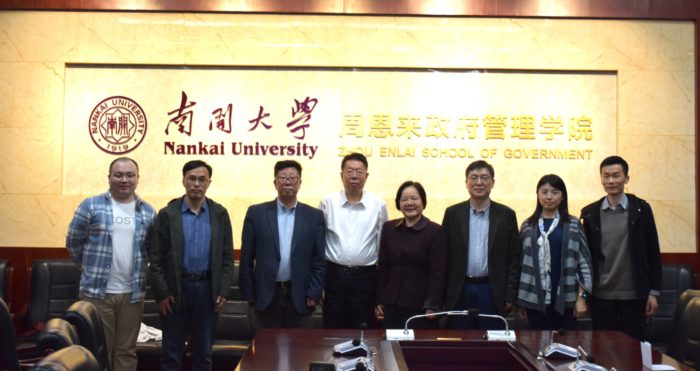
Global China Academy’s President Professor Xiangqun Chang’s Academic Activities in Xiamen, Wuhan and Tianjin, 4-11 April 2023
Introduction
On the occasion of being an invited speaker at the ‘International Conference: Chinese Path to Modernization and Pursuit of Humanity’s Common Values’ held at Xiamen University from April 4th to 6th, 2023, I visited China and engaged in a series of lectures, seminars, and academic exchanges at various universities in Xiamen, Wuhan, Tianjin, and Beijing. In addition to fulfilling our academic duties, I also participated in events and activities aligned with the social missions of the Global China Academy. This account does not include activities related to academic and social missions in Beijing.
Timeline
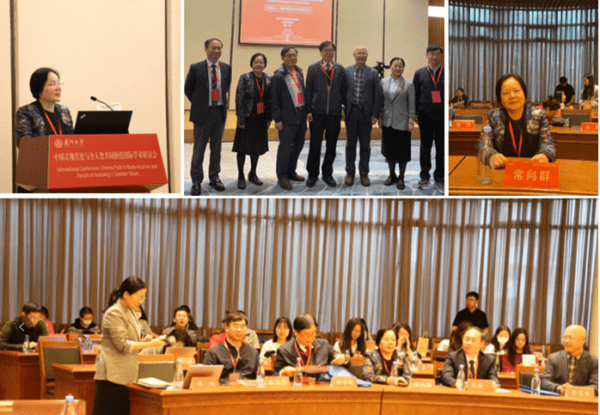
From April 4-6, I participated in a 3-day conference named ‘International Conference: Chinese Path to Modernization and Pursuit of Humanity’s Common Values’. It was organized by the newly established Institute of Chinese Path to Modernization and Division of Social Sciences at Xiamen University. The conference included three panels: Chinese Path to Modernization and Global Governance, Chinese Path to Modernization and International Communication, and Chinese Path to Modernization and Traditional Chinese Culture, with Panel 3 chaired by Professor ZHANG Yu, Deputy Director of the School of Taiwan Studies. My talk, titled ‘Realization of Goal-Oriented Cooperative Projects, Promoting the Common Value of Mankind: A Corpus-Assisted Analysis of ‘recipropriety’ (lishang-wanglai 互适),’ focused on global society governance, exploring humanity’s common values and differences through corpus-based texts and case analyses of cooperative projects using the concept of ‘recipropriety.’ I aimed to deepen mutual understanding and achieve common project goals by discussing different values and seeking common ground while preserving diversity.
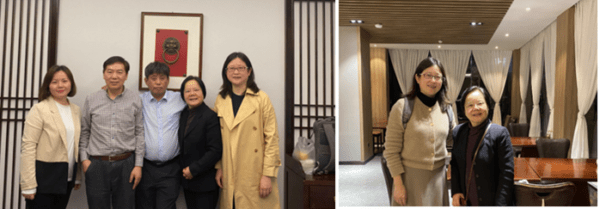
On the evening of April 4th, Professor HU Rong (2nd left in the left photo), Dean of the School of Sociology and Anthropology, hosted an academic exchange meeting. Attendees included myself, Professor Donggen Rui (in the middle of right photo) from Pukyong National University, South Korea, anthropologist Professor GONG Haoqun, and sociologist Associate Professor LU Wei. On afternoon of April 5th, Professor GONG Haoqun (right photo) and I had an in-depth discussion on anthropological issues from a comparative perspective, based on my work and that of some fellow anthropologists on comparing Chinese and non-Chinese societies.

On the afternoon of April 6th, Professor Donggen Rui (right in the left photo) and I met with Professor LI Minghuan (left in the right photo) from the School of Sociology and Anthropology at Xiamen University. She is the Vice President of the Chinese Overseas History Society and was an invited speaker at a conference I organized in 2013 at LSE.Dr. HE Ruifu (left in the left photo) hosted the tea and lunch meeting. He obtained his PhD on family networks in a rural village in Fujian under Professor Stephan Feuchtwang at City University in 1993 when I worked there. He formerly served as the Deputy District Chief of Siming District, Xiamen City, the Deputy Director of the Research Office of the Xiamen Municipal Committee of the Chinese People’s Political Consultative Conference (CPPCC), and the Executive Vice Chairman of the Xiamen Federation of Social Science Associations. He is the editor of Gulangyu Island Studies, a series of research books. They cover various topics, including the history and cultural relations of Gulangyu Island with countries such as the UK, Germany, and Japan, as well as studies on overseas Chinese and women’s research.
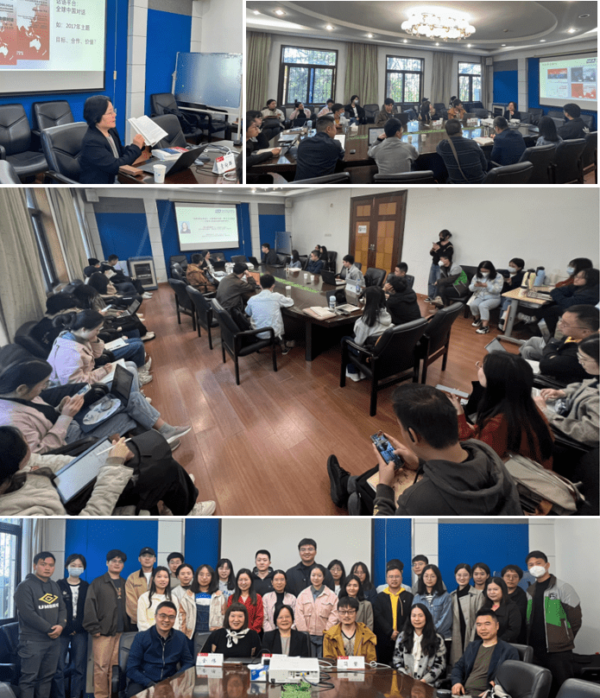
On the morning of April 9th, I delivered a lecture entitled ‘A Corpus-Assisted Social Scientific Approach: A Textual Analysis Methodology in the Era of Big Data’ at the Marxist School of Wuhan University. I shared the background of my involvement with this method. In the era of big data, with the overwhelming presence of massive electronic texts, the traditional quantitative and qualitative analysis methods in social sciences face significant challenges. The presentation by speakers from the ESRC Centre for Corpus Approaches to Social Science (CASS) at Lancaster University during the 3rd Global China Dialogue in 2016 showcased the effectiveness of the corpus approach in addressing social scientific issues related to climate changes. Inspired and guided by experts from the ESRC CASS, the Global China Institute, which later became the Global China Academy, organized the workshop on Corpus Approaches to Chinese Social Science (CACSS). Three years following the workshop, the Journal of Corpus Approaches to Chinese Social Science (JCACSS, Chinese Edition) was launched, published by Global Century Press and edited by Professor QIAN Yufang at Zhejiang Gongshang University.
To commemorate the 105th anniversary of the birth of China’s distinguished social scientist and pioneer of Marxist sociology, Professor Ding Kequan (1914-1989), and the 110th anniversary of the birth of our country’s famous sociologist, anthropologist, social activist, and Chinese national leader, Professor Fei Xiaotong (1910-2005), I, along with assistance from Professor QIAN Yufang and other colleagues, constructed three corpora. These include the Ding Kequan Collected Works (three volumes), Fei Xiaotong Complete Works (20 volumes), and the Marx and Engels Complete Works (50 volumes) corpus. My lecture aimed to share experiences and provide examples demonstrating how to bridge the disciplines of sociology and applied linguistics. Professor JIN Wei (to my right in the group photo) organized the lecture, and Professor JIAN Fan (to my left in the group photo), the Vice Dean of the Marxist School, chaired the lecture.
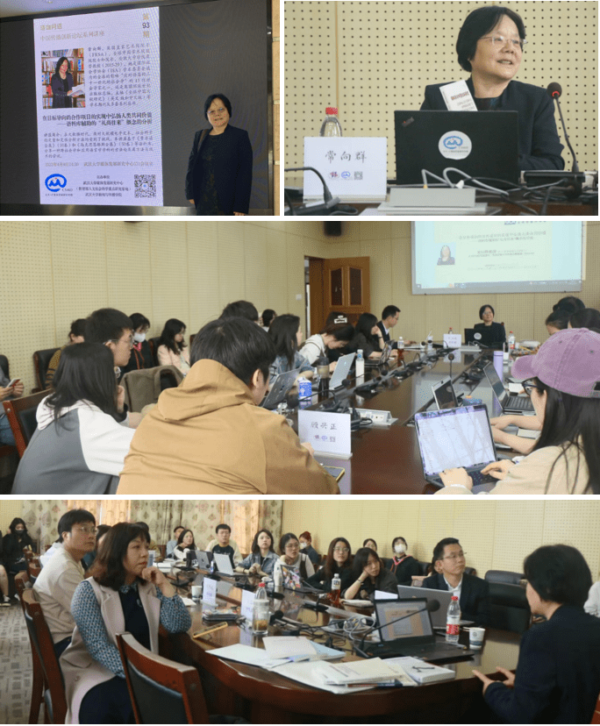
On the afternoon of April 9th, I gave a seminar at the Wuhan University Center for Media Development Studies, which is one of the four media studies bases of the Ministry of Education, alongside those at Tsinghua University, Renmin University of China, and Fudan University. The Wuhan University Center founded the Journal of Cross-Cultural Communication Research, where a comprehensive interview article titled ‘The Concept, Practice, and Production of Transculture from a Global Perspective’, conducted by Professor WANG Xin with me, was published in the journal (Vol. 5, 2022).
The seminar was chaired by Professor WU Shiwen (on my right in the bottom photo), Director of the Institute for Health Communication Research at the Wuhan University Center for Media Development Studies. The title of my seminar was Realization of Goal-Oriented Cooperative Projects, Promoting the Common Value of Mankind: A Corpus-Assisted Analysis of ‘recipropriety’ (lishang-wanglai 互适). This is the same title as the presentation I delivered at the Xiamen conference.
Professor XIAO Jun (on the left side of me in the bottom photo), the Deputy Director of both the Centre and Department of Internet Communication at the School of Journalism and Communication, Wuhan University, provided me with a guided tour of the Center, School, and University Campus before and after my talk. Immediately after visiting Xiamen University, I shared my comparative views on these two most beautiful university campuses in China. Both offer a rich blend of natural beauty and architectural elegance. The serene coastal vibes of XMU, combined with the blend of Eastern and Western architectural styles, provide a unique, tranquil environment for study and reflection. In contrast, the lush, blossoming landscapes of WHU, famous for their cherry blossoms and palatial architecture, offer a historically rich and aesthetically pleasing environment.
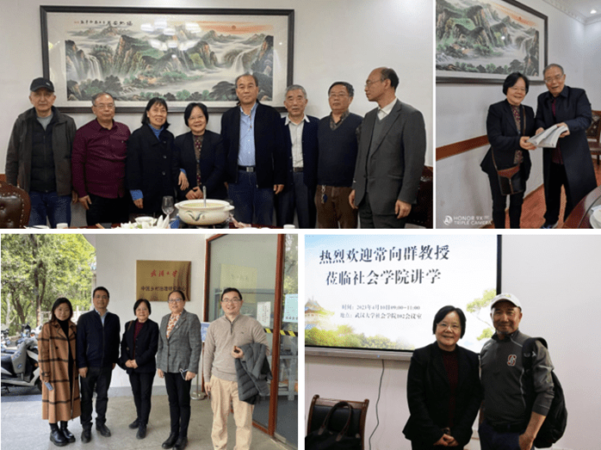
On the evening of April 9th, Professor LUO Jiaojiang (2nd left in the top left photo), who is the former Director of the Institute of Social Development at Wuhan University and also the former Vice President of the Global China Institute (the predecessor of GCA), arranged a meeting for me with some colleagues in Wuhan. Together with his colleague, Research Fellow LUO Jun (1st right in the top left photo), and myself, we were awarded the major research project ‘Emergence, Status, and Prospect of Computational Social Science in the Big Data Era’ by the National Social Science Fundation of China, undertaken by Wuhan University in 2016. Professor WANG Tie (on my left in the top left photo), the former Director of the Institute of Information at the Wuhan Academy of Social Science, also attended the meeting.
On the morning of April 10th, outside the building of the School of Sociology, I met with Professor WU Lin (on my right in the bottom left photo), Vice Dean of the School of Sociology, Dr CAI Lei, Associate Professor (1st left in the bottom left photo), and Dr GONG Weigang, Associate Professor (1st right in the bottom left photo). In the lecture room, Professor ZHOU Changcheng (right in the bottom right photo) popped in to meet me before the lecture. He was the Vice Dean of the School of Law, Deputy Director of the Department of Sociology, and President of the Wuhan Sociological Association. I was surprised to see him dressed in gold clothes and a hat on the university campus. We shared common interests during lunchtime.
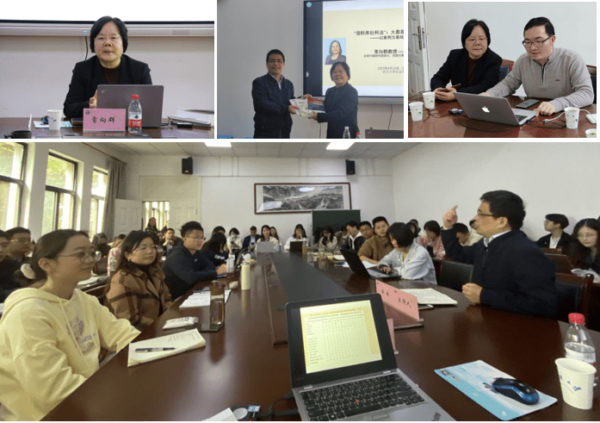
The lecture was chaired by Professor WU Lin (right in the bottom photo), Vice Dean of the School of Sociology. The title of the lecture was ‘A Corpus-Assisted Social Scientific Approach: A Textual Analysis Methodology in the Era of Big Data,’ the same as the one I delivered at the Marxism School. During the Q&A, Dr CAI Lei shared with everyone that she attended my lecture eight years ago in 2014, when she was a Master’s student in the Department of Sociology. She was very impressed and noted that I returned to the department with a very different topic.
Dr. GONG Weigang also shared with everyone that he was a team member of the aforementioned major research project on computational social science that I co-developed. His question caught my attention. After the lecture, I followed Dr Gong to his office. Gong showed me his collections of data resources (right in the top photo), for example, approximately 5 million volumes of English text corpora from 1800-1900, basic information of 2.1 million Twitter users, 5 billion historical tweets since 2019, 3 billion historical Twitter keyword data, 530 million basic user information on Facebook, 400 million basic user information on LinkedIn, 13TB of global online public opinion data, and 1.4 billion web page news headlines and text content. Based on analyzing the data, their team published some journal articles, such as ‘Media Hegemony, Cultural Circle, and the Global Dissemination of the Orientalist Discourse: Taking Public Opinion on China in GDELT as an Example,’ by GONG Weigang, ZHU Meng, ZHANG Sai, and LUO Jiaojiang, in Sociological Studies, vol. 5, 2019.
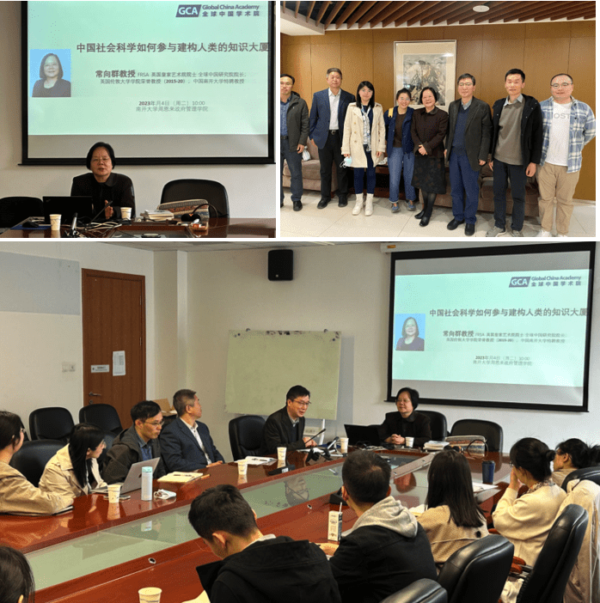
On the morning of April 11th, I delivered a seminar to the faculty of the Sociology Department at Nankai University, titled ‘How Chinese Social Sciences Contribute to the Construction of Humanity’s Edifice of Knowledge.’ Focusing on leveraging China’s academic contributions globally, I emphasized the importance of Chinese social sciences’ participation in constructing the global knowledge system. I highlighted significant milestones, such as the influential works published by Chinese scholars when China was the ‘market focus’ at the 2012 London Book Fair. I also reflected on my experiences and observations at academic forums, critiquing the neglect of methodological rigor in discussions about transforming Beijing into a global academic center. My talk presented the evolution of Chinese social sciences, emphasizing the challenges and opportunities presented by big data for qualitative and quantitative research, and spotlighted the emergence of computational social science and the application of corpus methodologies as innovative approaches to social science research. The goal was to showcase the evolving landscape of the social sciences in China and their impact on global academic discourse.
Professor ZHAO Wanli (on the right of me in the bottom photo), the Deputy Dean of the Zhou Enlai School of Government, chaired the seminar. In response to the challenges, he introduced some young generation scholars in the faculty who have received international training and expressed hope that future collaborations would be strengthened. Professor WANG Bingyu (on my right in the top right photo), obtained her PhD from the University of Auckland, New Zealand, and has been working as an Associate Editor of the Journal of Ethnic and Migration Studies (JEMS) since 2021. She expressed her willingness for further discussion and collaborations.
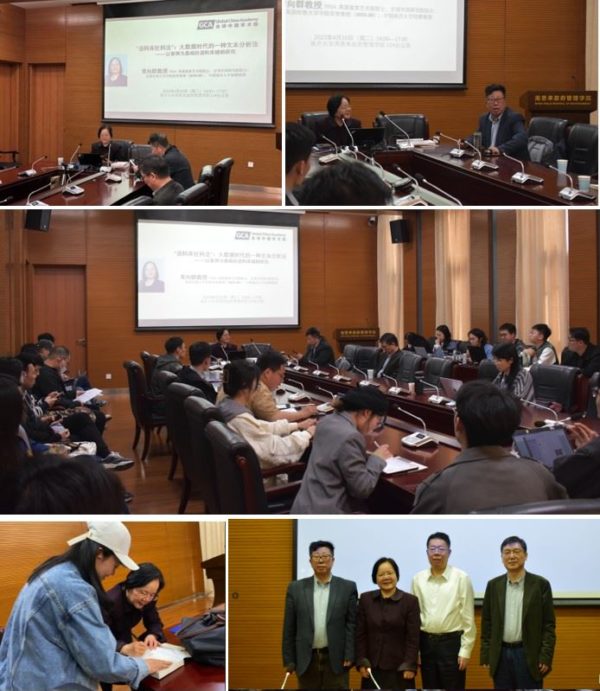
On the afternoon of April 11th, I delivered a lecture to the faculty and students of the Sociology Department at Nankai University. The lecture was titled ‘A Text Analysis Method in the Era of Big Data: Corpus-Assisted Research Based on Case Studies’. It explored the application of corpus methodology in the social sciences and humanities, specifically focusing on the Chinese context. The lecture provided an overview of ‘Corpus Approaches to Social Science’, demonstrating how large-scale electronic text analysis can reveal patterns, substantiate theories, and inform research direction. I detailed various types of corpora, analytical tools, and case studies, including the digitalization of Chinese medical classics and critical discourse analysis. It highlights the integration of corpus linguistics with social science methodologies, demonstrating the potential for deepening understanding of complex social phenomena through quantitative and qualitative analyses.
Professor ZHANG Wenhong, on my left in the top right photo, Dean of the Zhou Enlai School of Government, chaired the lecture. Professor ZHU Guanglei (on my right in the bottom right photo), former Vice-President of Nankai University, attended the lecture. He is Life Fellow of the Global China Academy (click here to watch greeting video at the GCA’s founding ceremony). Afterwards, among the many students who asked questions related to my lecture, a PhD student, LU Hanxu, brought my book, On Marxist Sociology (1992/2018), and asked for a signature. Lu is writing her PhD thesis entitled ‘The Study of the Sinicization of Marxist Sociology (1919-1949)’ under the supervision of Professor ZHAO Wanli, who is also the Director of the first national research Center for Marxist Sociology in China.
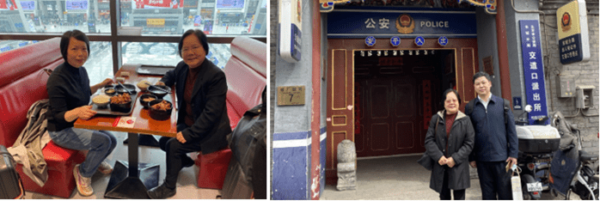
On the morning of April 13th, I was invited to deliver a lecture at the School of Art at Tianjin Polytechnic University. The title of the lecture was ‘Transculturality’ and Art Communication. As the global era quietly transitions into the digital age, cross-cultural discourse is increasingly challenged by ‘transcultural’ discourse. My lecture aimed to showcase the similarities and differences between ‘transcultural’ and both cross-cultural and intercultural communications through the examination of ‘transcultural’ products and practices in different art forms during the cultural exchange process between China and other countries, mainly the UK. It was intended to introduce case practices of ‘transculturality’, the vitality of its concept in cultural communication, and the analytical power of related research. However, due to a personal matter, the lecture was canceled. Professor ZHANG Qiugui (left in the left photo), who was scheduled to chair the lecture, is seen seeing me off from Tianjin West Station.
Two hours later, I arrived at the Beijing Jiaodaokou Police Station, where I met Professor ZHOU Yunwei (in the right photo), Deputy Dean of the School of Police Information Engineering and Cybersecurity at the People’s Public Security University of China (PPSUC). It was our first meeting since I interviewed him in his hometown, Xianning County of Hubei Province, in 1990. At that time, I worked at PPSUC and represented both PPSUC and PPUC (People’s Police University of China, which merged with PPSUC in 1998), for student recruitment in Hubei Province. Zhou was among those admitted to PPUC from an ordinary family background. In the ‘Postscript’ of his book, Principles of Electromagnetic Wave Evidence, Zhou expressed his gratitude to me for changing his life (PPSUC Press, 2021, p334). Learning that I needed official proof of my previously canceled Beijing Resident Certificate (hukou) to apply for a Foreigner’s Residence Permit, Zhou quickly offered his help. He arranged a meeting at the police station to accommodate my busy schedule, ensuring I could visit my 92-year-old mother in China without the need for a visa in the coming years. During lunchtime, we also discussed possible collaboration with colleagues at the PPSUC in related fields from a global and comparative perspective.
In theory, my academic activities should have concluded at Nankai University. The two incidents on April 13th serve as records of my experiences in China. I was scheduled to give a lecture on ‘Transculturality and Art Communication’ at Tianjin Polytechnic University, but it was canceled due to personal reasons. This is because I learned that a Foreigner’s Residence Permit in China can facilitate my future visa-free visits to my mother in China, and obtaining official documentation for my canceled Beijing Resident Certificate fit into my very busy schedule.
* * * *
By participating in the three-day ‘International Conference: The Chinese Path to Modernization and the Pursuit of Humanity’s Common Values’ from April 4th to 6th, as well as subsequent academic exchanges and visits, I deeply felt the diversity and complexity of China’s exploration in the process of modernization. This conference not only provided me with a platform to present and discuss the application of the concept of ‘recipropriety’ in global social governance but also gave me the opportunity to engage in in-depth exchanges and discussions with scholars from different disciplinary backgrounds. These activities emphasized the contributions of Chinese social sciences to the construction of the global knowledge system, and the importance of interdisciplinary research and international cooperation in driving innovation in social sciences and understanding complex social phenomena.
Anyway, through a series of lectures and seminars at higher education institutions such as Xiamen University, Wuhan University, and Nankai University, I profoundly understood the importance that both China and the global academic community place on social science methodologies, as well as the potential and challenges of corpus methods in social science research in the era of big data. These experiences not only enriched my academic perspective but also provided new ideas and directions for future research explorations in the interdisciplinary fields of social sciences and applied linguistics. This series of academic activities not only showed China’s active role in global academic discussions but also reflected the high attention and recognition of the international academic community towards Chinese social science research. I look forward to more such exchanges and cooperation in the future, collectively advancing the development and innovation of social sciences, and offering new perspectives and solutions for addressing global issues.
By Xiangqun Chang
- Click here to view Global China Academy’s President Professor Xiangqun Chang’s Academic Activities in Beijing,18-20 April 2023
- Click here to view Social Mission Activities and Reflection of GCA President Xiangqun Chang in China, April 2023
- Click here to see the GCA Centre’s facilities: Driveway, Garden, Function Rooms, Libraries, Dining Area, Bedrooms, and more.
- Click here to explore the 5 ‘walk and talk’ routes, including tea and lunch. The PDF file can be downloaded.
- Click here to reach us including details on how to visit us.
- Click here to visit the GCA news section.

